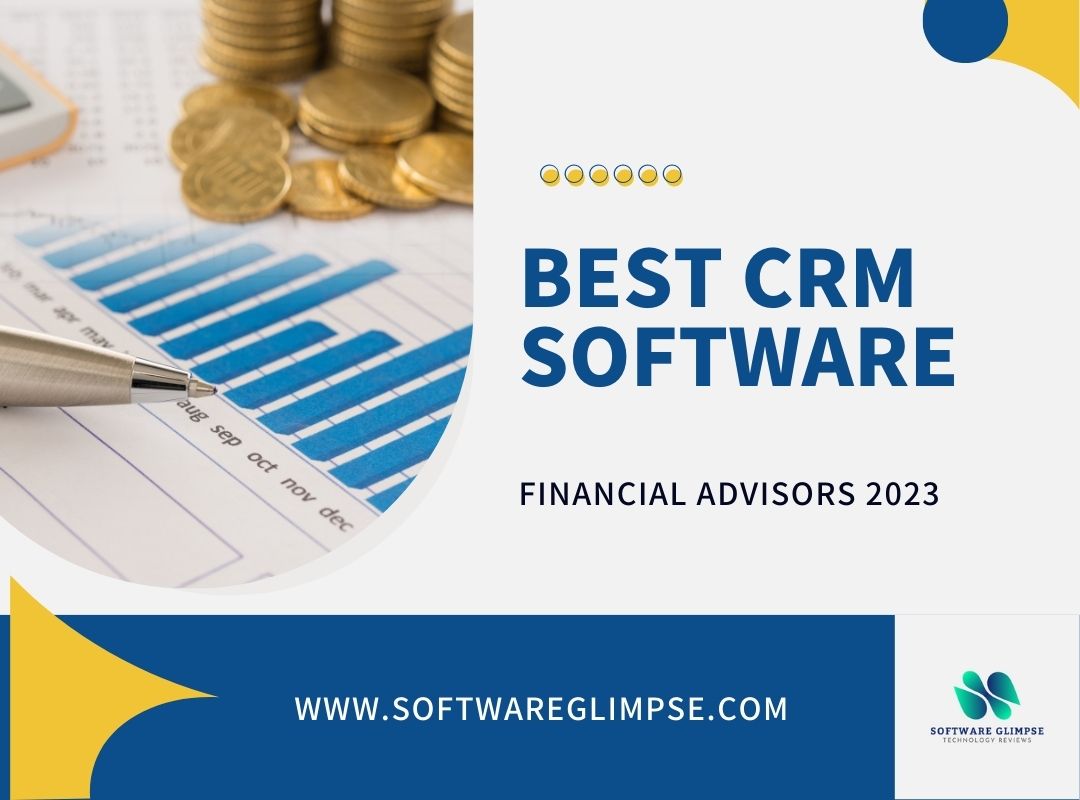Crm software for financial advisors – In today’s competitive financial landscape, efficiently managing client relationships is paramount for success. Customer Relationship Management (CRM) software offers financial advisors a powerful tool to streamline operations, enhance client engagement, and ultimately, boost profitability. This comprehensive guide delves into the world of CRM software specifically tailored for financial advisors, exploring its key features, benefits, and considerations for implementation.
Understanding the Needs of Financial Advisors
Financial advisors face unique challenges in managing their client base. They need systems that handle sensitive client data securely, facilitate personalized communication, track complex financial portfolios, and comply with stringent regulatory requirements. A robust CRM system addresses these needs by centralizing client information, automating tasks, and providing valuable insights for strategic decision-making. This includes managing everything from initial client onboarding to long-term portfolio reviews and legacy planning.
Key Challenges Faced by Financial Advisors:
- Client Relationship Management: Maintaining consistent contact and personalized service across a large client portfolio can be demanding.
- Compliance and Security: Financial advisors must adhere to strict regulations regarding data privacy and security (e.g., GDPR, CCPA).
- Productivity and Efficiency: Manual processes for tasks like scheduling, reporting, and communication can significantly impact productivity.
- Data Analysis and Reporting: Accessing and analyzing client data to identify trends and opportunities requires sophisticated tools.
- Scalability and Growth: As the client base expands, the CRM system should be able to adapt and scale accordingly.
Essential Features of a CRM for Financial Advisors: Crm Software For Financial Advisors
A CRM designed for financial advisors goes beyond basic contact management. It incorporates specialized features crucial for success in the industry. These include:
Core CRM functionalities:, Crm software for financial advisors
- Contact Management: Centralized database for storing comprehensive client information, including contact details, financial profiles, and interaction history.
- Lead Management: Tracking and nurturing leads throughout the sales pipeline, from initial contact to conversion.
- Communication Management: Integrated tools for email marketing, SMS messaging, and scheduling appointments.
- Document Management: Secure storage and retrieval of client documents, such as contracts, financial statements, and tax returns.
- Reporting and Analytics: Generating customized reports on key performance indicators (KPIs), client activity, and sales trends.
- Workflow Automation: Automating repetitive tasks such as email sequences, appointment reminders, and report generation.
- Integration with other Financial Tools: Seamless integration with portfolio management software, accounting software, and other financial technology platforms.
- Security and Compliance: Robust security measures to protect sensitive client data and ensure compliance with industry regulations.
- Client Portal: Secure online access for clients to view their portfolio, documents, and communicate with the advisor.
- Calendar and Scheduling: Efficient scheduling and management of client meetings and appointments.
Benefits of Using CRM Software for Financial Advisors
Implementing a CRM system offers numerous benefits that can significantly impact a financial advisor’s business:
- Improved Client Relationships: Personalized communication and proactive engagement foster stronger client relationships.
- Increased Productivity: Automation of tasks frees up time for more strategic activities, such as client acquisition and portfolio management.
- Enhanced Compliance: Centralized data storage and secure access help ensure compliance with regulatory requirements.
- Better Data-Driven Decisions: Access to real-time data and analytics enables informed decision-making.
- Improved Sales and Revenue: Efficient lead management and client nurturing can lead to increased sales and revenue.
- Scalability and Growth: A robust CRM system can adapt to the growth of the business, supporting expansion and increased client base.
Choosing the Right CRM Software
Selecting the appropriate CRM software requires careful consideration of various factors:
- Size of your client base: The scale of your operation will influence the features and capacity you need.
- Budget: CRM software comes in various pricing tiers, from affordable options to enterprise-level solutions.
- Specific features: Prioritize features that align with your business needs and workflows.
- Integration capabilities: Ensure seamless integration with existing financial tools and platforms.
- Ease of use: Choose a system that is intuitive and easy for your team to learn and use.
- Customer support: Reliable customer support is essential for resolving issues and getting assistance when needed.
- Security and compliance: Verify that the software meets industry security and compliance standards.
Examples of CRM Software for Financial Advisors
Several reputable CRM providers offer solutions tailored for financial advisors. Researching and comparing different options is crucial to finding the best fit. Some popular examples include (but are not limited to):

Source: techfunnel.com
- Salesforce Financial Services Cloud: A comprehensive platform with robust features for managing client relationships, portfolios, and regulatory compliance.
- Redtail CRM: A popular choice among financial advisors, known for its user-friendly interface and specialized features for the financial industry.
- Wealthbox: Designed specifically for financial advisors, Wealthbox offers a streamlined experience with strong client communication and reporting capabilities.
- Junxure: A powerful CRM often used by larger financial advisory firms, known for its comprehensive features and scalability.
Frequently Asked Questions (FAQ)
- Q: Is CRM software expensive? A: The cost of CRM software varies widely depending on the provider, features, and number of users. There are affordable options available for smaller firms, as well as enterprise-level solutions for larger organizations.
- Q: How long does it take to implement a CRM system? A: Implementation time depends on the complexity of the system and the size of your client base. It can range from a few weeks to several months.
- Q: Does CRM software integrate with other financial tools? A: Many CRM systems offer integration with other financial software, such as portfolio management systems and accounting software. It’s essential to check for compatibility before selecting a CRM.
- Q: What are the security measures in place for client data? A: Reputable CRM providers implement robust security measures, including encryption, access controls, and regular security audits, to protect sensitive client data.
- Q: How can I measure the ROI of a CRM system? A: You can measure ROI by tracking key metrics such as increased client retention, improved sales conversion rates, and reduced administrative costs.
Conclusion
Implementing a CRM system is a strategic investment for financial advisors seeking to improve efficiency, enhance client relationships, and drive business growth. By carefully considering your specific needs and selecting the right software, you can leverage the power of CRM to achieve your business objectives and thrive in a competitive market. The right CRM can be a game-changer, helping you build lasting client relationships and achieve sustainable success.
References
While specific product pages are constantly changing, general information on CRM and its application in the financial sector can be found through searches on reputable sites like:
- Gartner (for industry analysis and reports)
- Forbes (for business and technology news)
- Individual CRM vendor websites (e.g., Salesforce, Redtail, Wealthbox)
Call to Action
Ready to transform your financial advisory practice? Explore the leading CRM solutions available and request a demo today to see how they can benefit your business. Don’t wait – take the first step towards a more efficient and profitable future!
FAQ Explained
What types of data can a CRM store for financial advisors?
CRMs can store a wide range of data, including client demographics, investment portfolios, transaction history, communication logs, meeting notes, and financial goals.
How does CRM software improve client retention?
By providing a centralized view of client interactions and needs, CRMs enable advisors to personalize communication, proactively address concerns, and maintain consistent engagement, leading to higher client retention rates.
What is the cost of implementing a CRM for a financial advisory firm?

Source: softwareglimpse.com
The cost varies greatly depending on the chosen software, the number of users, and the features included. Some offer subscription-based models while others require upfront investments. It’s crucial to carefully assess needs and budget before selecting a system.

Source: squarespace.com
How can I choose the right CRM software for my firm?
Consider factors like your firm’s size, budget, specific needs, and integration capabilities with existing systems. Research different options, compare features, and request demos to find the best fit.
